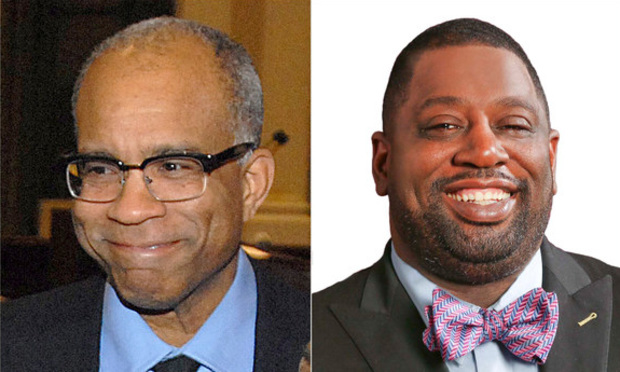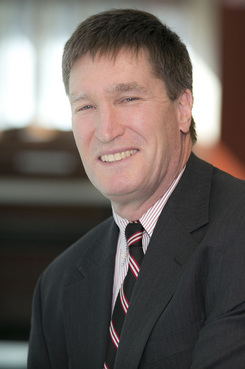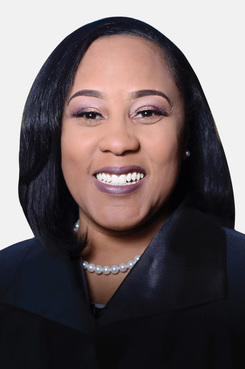Legal Community Split Over Emory Professor's Use of Racial Slur
A Harvard and a Princeton professor have thrown their support behind the professor, while several former Emory alumni said the racial slur never should have been used.
April 09, 2019 at 02:44 PM
8 minute read
 Randall Kennedy (left) and Marvin Arrington Jr.
Randall Kennedy (left) and Marvin Arrington Jr.
Two law professors and a former law school dean have offered their public support to an Emory law professor suspended over the use of a racial slur.
Affidavits from Harvard University's Randall Kennedy, Princeton's Keith Whittington, and Talbot “Sandy” D'Alemberte, the former president of Florida State University where he also served as the law school's dean, were included in formal complaints calling for Emory's censure. Retired Emory law professor William Carney asked the American Bar Association and the American Association of University Professors to censure Emory for placing law professor Paul Zwier on indefinite administrative leave and banning him from campus.
Carney, who with his wife donated $1 million to the law school in 2015, also called for Emory to be placed on academic probation for what he said were violations of Zwier's academic freedom. Zwier twice used a slur in contexts he has contended were neither gratuitous nor employed to demean an individual or group.
But three prominent Emory law school alumni maintain that Zwier's utterance of a racial epithet remains inexcusable despite his explanations for what prompted him to use the word.
Carney's letter to the ABA and the AAUP included exhibits detailing Zwier's own account of how he came to use the slur in a torts class while discussing an offensive battery civil case. The professor later used a variation of the slur in a private conversation with a black student who had publicly demanded his resignation. During the meeting, Zwier shared that he had been called a “n—-r lover” when he was young because of his parents' support for civil rights, Carney's letter said.
Kennedy—a former law clerk for U.S. Supreme Court Justice Thurgood Marshall and the author of a book on the use of the slur as a “linguistic weapon”—said Zwier's use of the word “was neither careless nor malicious.”
 Emory law professor Paul Zwier.
Emory law professor Paul Zwier.Zwier introduced the slur in a discussion during the first week of classes last year “that was clearly relevant to the subject matter at hand,” said Kennedy, who added the slur is “a volatile, disturbing, hurtful term.”
“To subject him [Zwier] to any administrative punishment under these circumstances is a wrongful and deeply disturbing encroachment on academic freedom,” the Harvard law professor said.
Kennedy also disagreed with critics “who suggest that the only proper way to explore the terrain that Professor Zwier sought to explore was to deploy the euphemism 'n-word' or some other circumlocution.”
“Using a euphemism might avoid hurt feelings,” he said. “Doing so, however, might subtract from the vividness that often accompanies the most memorable teaching.”
Kennedy also disagreed with critics who said that only an African American professor could use the term.
“Racial discrimination of this sort is unjustifiable academically,” Kennedy concluded. “It would also likely be found to be illegal under federal employment discrimination law.”
Whittington, a law professor and author of a book on campus free speech, suggested that Zwier made “a valid, if contestable” choice in electing to use the racial epithet in a law school class.
“Professor Zwier is not accused of hurling the n-word as a personal slur directed toward a student or of introducing it with no apparent educational purpose,” Whittington said. “He introduced the word in class as part of an effort to lead the students to think through an important issue about how legal cases develop and in a manner that was wholly in keeping with and appropriate to the particular case being discussed and the issues it raised.”
“He also appears to have introduced the word in his office in order to report on his own biographical experiences in a way that was pertinent to the subject being discussed,” Whittington added.
FSU's D'Alemberte concurred that Zwier's use of the n-word “in a class discussion of verbal torts and harassment” was “well within the bounds of academic freedom.”
“Professor Zwier and his family have been substantially damaged by Emory law's mismanagement and handling of this situation,” D'Alemberte said. Zwier, he added, “is owed a clear and unequivocal apology” from Emory law school dean James Hughes Jr. “as well as compensation for the economic consequences of the failure to honor his academic freedom and First Amendment rights and the serious career damage inflicted.”
But Fulton County commissioner and Emory law school alumnus Marvin Arrington Jr.—who issued an open letter to the Emory community last year demanding Zwier's immediate termination—was unmoved by Zwier's explanations for using the slur.
Arrington's father, Marvin Arrington Sr., along with Senior Judge Clarence Cooper of the U.S. District Court for the Northern District of Georgia, were the first two African Americans admitted to Emory's law school as full-time day students.
Arrington said “there is no acceptable use” of the racial slur. “Not in a classroom setting. Particularly not [by] a professor who has all of the power,” he said. “It's more egregious. It's like being at a job. … If your boss is using a racial slur, you don't feel you can do anything about it. You don't know who to go to. It creates a hostile work environment.”
Arrington said Zwier's utterance of the slur also violates Emory's core values and the university's mission statement. “They say they do not tolerate this type of behavior,” Arrington said. “Obviously, they do.”
“It was unacceptable for him [Zwier] to even be around to use it [the slur] a second time,” Arrington continued. “He should have been gone the first time.”
 Fani Willis.
Fani Willis.Atlanta attorney Fani Willis—a former veteran Fulton County prosecutor now working with the state's judicial watchdog agency and Arrington's law school classmate—said Zwier's explanation for using the slur “didn't make much sense.”
Willis said Zwier's use of the slur in class was “insensitive,” and his decision to use it a second time in conversation with a student after being disciplined and warned about its use was “wrong.”
“We shouldn't make excuses for it,” she said. “It doesn't bode well. It's a conversation we shouldn't have to have.”
Willis called the controversy “heartbreaking,” “disappointing” and “a smudge” on Emory's reputation. The issue, she said, is also bigger than Zwier alone.
“Do you know how hard it is to be a black law student at Emory?” she continued. “ It's not a warm environment, I assure you. … No matter what people want to say, it is a different experience for minority students, it just is.”
“We want to attract the best and the brightest,” she added. “Some of the best and brightest will be brown people, and we want to make sure they will be welcome there.”
Retired Fulton County Superior Court Judge Thelma Wyatt Cummings Moore—an Emory law graduate and former member of the Emory Board of Trustees—said she was stunned by Carney's call to place Emory on academic probation.
Zwier “should have been sensitive enough … to know you don't ever use that word,” she said. “You shouldn't use it in any context. It should be banned, deleted from your vocabulary. Yet he used it.”
Moore said that Zwier's decision to use a variation of the slur generally reserved for whites was “even worse” because it was in a one-on-one conversation with an African American student who came to Zwier's office to discuss the matter.
“I'm sure it's traumatic for these youngsters who have not been faced with this, as people of my generation have,” she said.
Zwier “should have had better judgment,” she added. “He certainly could have found some other way to say what he was trying to say without using the explicit term.”
Moore also said there needs to be “a better understanding of what is offensive, what is not offensive, how you say certain things,” or whether they should be said at all.
“That conversation still needs to be held,” she said.
This content has been archived. It is available through our partners, LexisNexis® and Bloomberg Law.
To view this content, please continue to their sites.
Not a Lexis Subscriber?
Subscribe Now
Not a Bloomberg Law Subscriber?
Subscribe Now
NOT FOR REPRINT
© 2025 ALM Global, LLC, All Rights Reserved. Request academic re-use from www.copyright.com. All other uses, submit a request to [email protected]. For more information visit Asset & Logo Licensing.
You Might Like
View All

From 'Confusing Labyrinth' to Speeding 'Roller Coaster': Uncertainty Reigns in Title IX as Litigators Await Second Trump Admin
6 minute read
University of Georgia School of Law Finds Next Dean on Its Own Faculty
3 minute read
Teen Charged in Barrow School Shooting and His Father to Stay in Custody After Hearings
5 minute readTrending Stories
- 1Uber Files RICO Suit Against Plaintiff-Side Firms Alleging Fraudulent Injury Claims
- 2The Law Firm Disrupted: Scrutinizing the Elephant More Than the Mouse
- 3Inherent Diminished Value Damages Unavailable to 3rd-Party Claimants, Court Says
- 4Pa. Defense Firm Sued by Client Over Ex-Eagles Player's $43.5M Med Mal Win
- 5Losses Mount at Morris Manning, but Departing Ex-Chair Stays Bullish About His Old Firm's Future
Who Got The Work
J. Brugh Lower of Gibbons has entered an appearance for industrial equipment supplier Devco Corporation in a pending trademark infringement lawsuit. The suit, accusing the defendant of selling knock-off Graco products, was filed Dec. 18 in New Jersey District Court by Rivkin Radler on behalf of Graco Inc. and Graco Minnesota. The case, assigned to U.S. District Judge Zahid N. Quraishi, is 3:24-cv-11294, Graco Inc. et al v. Devco Corporation.
Who Got The Work
Rebecca Maller-Stein and Kent A. Yalowitz of Arnold & Porter Kaye Scholer have entered their appearances for Hanaco Venture Capital and its executives, Lior Prosor and David Frankel, in a pending securities lawsuit. The action, filed on Dec. 24 in New York Southern District Court by Zell, Aron & Co. on behalf of Goldeneye Advisors, accuses the defendants of negligently and fraudulently managing the plaintiff's $1 million investment. The case, assigned to U.S. District Judge Vernon S. Broderick, is 1:24-cv-09918, Goldeneye Advisors, LLC v. Hanaco Venture Capital, Ltd. et al.
Who Got The Work
Attorneys from A&O Shearman has stepped in as defense counsel for Toronto-Dominion Bank and other defendants in a pending securities class action. The suit, filed Dec. 11 in New York Southern District Court by Bleichmar Fonti & Auld, accuses the defendants of concealing the bank's 'pervasive' deficiencies in regards to its compliance with the Bank Secrecy Act and the quality of its anti-money laundering controls. The case, assigned to U.S. District Judge Arun Subramanian, is 1:24-cv-09445, Gonzalez v. The Toronto-Dominion Bank et al.
Who Got The Work
Crown Castle International, a Pennsylvania company providing shared communications infrastructure, has turned to Luke D. Wolf of Gordon Rees Scully Mansukhani to fend off a pending breach-of-contract lawsuit. The court action, filed Nov. 25 in Michigan Eastern District Court by Hooper Hathaway PC on behalf of The Town Residences LLC, accuses Crown Castle of failing to transfer approximately $30,000 in utility payments from T-Mobile in breach of a roof-top lease and assignment agreement. The case, assigned to U.S. District Judge Susan K. Declercq, is 2:24-cv-13131, The Town Residences LLC v. T-Mobile US, Inc. et al.
Who Got The Work
Wilfred P. Coronato and Daniel M. Schwartz of McCarter & English have stepped in as defense counsel to Electrolux Home Products Inc. in a pending product liability lawsuit. The court action, filed Nov. 26 in New York Eastern District Court by Poulos Lopiccolo PC and Nagel Rice LLP on behalf of David Stern, alleges that the defendant's refrigerators’ drawers and shelving repeatedly break and fall apart within months after purchase. The case, assigned to U.S. District Judge Joan M. Azrack, is 2:24-cv-08204, Stern v. Electrolux Home Products, Inc.
Featured Firms
Law Offices of Gary Martin Hays & Associates, P.C.
(470) 294-1674
Law Offices of Mark E. Salomone
(857) 444-6468
Smith & Hassler
(713) 739-1250






